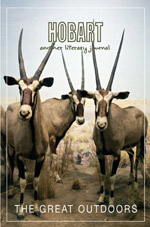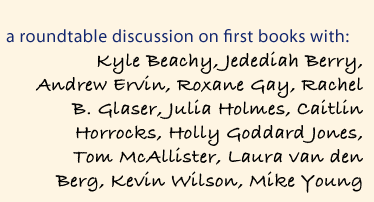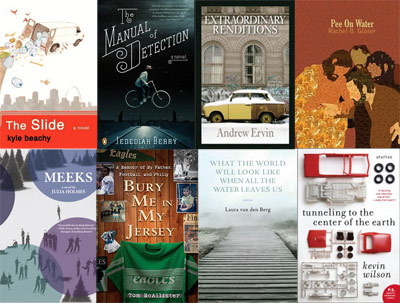|
|||||||||||||
| archives | submissions | blog | (dis)likes | ||||||||||
|
 |
|||
 |
|||
|
Are You Lonesome Tonight? |
|||
|
Space is Our Future |
|||
|
The Weirdest Thing |
|||
|
Sunsets Unlimited |
|||
|
489 Points |
|||
|
Rain Escape |
|||
|
They Shared an Egg |
|||
|
First Book Roundtable Discussion |
|||
|
Kyle Beachy is the author of The Slide (The Dial Press, 2009). He lives in Chicago and teaches writing and literature at the School of the Art Institute of Chicago, the Univeristy of Chicago's Graham School, and Roosevelt University. His short stories and essays have or will appear in St. Louis Magazine, Another Chicago Magazine, as a Featherproof Mini-Book, and elsewhere. |
|||
|
Jedediah Berry's novel The Manual of Detection (Penguin, 2009) won the William L. Crawford Award and the Dashiell Hammett Prize, and is a finalist for the New York Public Library Young Lions Award. His short stories have appeared in journals and anthologies including Conjunctions, Chicago Review, Best New American Voices, and Best American Fantasy. He is an editor at Small Beer Press. |
|||
|
Andrew Ervin's first book, a collection of novellas titled Extraordinary Renditions, will be published by Coffee House Press in September. His fiction has appeared in Conjunctions, Fiction International, The Southern Review, and elsewhere. He lives in Louisiana, but that is about to change. |
|||
|
Roxane Gay's first collection, Ayiti, will be released in the Fall of 2010 (Artistically Declined Press). Other work appears or is forthcoming in Mid-American Review, DIAGRAM, McSweeney's (online), Gargoyle, Annalemma and others. She is an assistant professor of English at Eastern Illinois University and co-editor of PANK. Find her online at www.roxanegay.com. |
|||
|
Rachel B. Glaser is the author of Pee On Water (Publishing Genius Press 2010). Her stories have appeared in 3rd Bed, New York Tyrant, Unsaid and others. She currently lives in Easthampton, MA with the author John Maradik. |
|||
|
Julia Holmes was born in Dhahran, Saudi Arabia, and grew up in the Middle East, Texas, and New York. She is a graduate of Columbia University’s MFA program in fiction, and lives in Brooklyn. Her first novel, Meeks, will be published by Small Beer Press in July. |
|||
|
Caitlin Horrocks is author of the story collection This Is Not Your City (Sarabande 2011). Her stories appear in The PEN/O. Henry Prize Stories 2009, The Pushcart Prize XXXV, The Paris Review and elsewhere, and have won awards including the Plimpton Prize. She lives in Grand Rapids MI, where she is an assistant professor at Grand Valley State University. |
|||
|
Holly Goddard Jones is the author of Girl Trouble, a collection of short stories. She teaches at UNC-Greensboro. |
|||
|
Tom McAllister's first book Bury Me in My Jersey: A Memoir of My Father, Football, And Philly (Villard/Random House) was released in May 2010. His shorter work has appeared in several publications, including Black Warrior Review, Barrelhouse, and Storyglossia. A 2006 graduate of the Iowa Writers' Workshop, he is currently a Lecturer in the English Department at Temple University in Philadelphia. |
|||
|
Laura van den Berg was raised in Florida and earned her MFA at Emerson College. Her fiction has appeared in One Story, American Short Fiction, Conjunctions, Best American Nonrequired Reading 2008, Best New American Voices 2010, and The Pushcart Prize XXIV, among others. Laura’s first collection of stories, What the World Will Look Like When All the Water Leaves Us (Dzanc Books, October 2009), was selected for the Barnes & Noble “Discover Great New Writers” Program and long-listed for both The Story Prize and the Frank O’Connor Award. She was the 2009-2010 Emerging Writer Lecturer at Gettysburg College and is the recipient of the 2010-2011 Tickner Fellowship at the Gilman School. |
|||
|
Kevin Wilson is the author of the story collection Tunneling to the Center of the Earth (Ecco/Harper Perennial, 2009). His fiction has appeared in Tin House, One Story, Ploughshares, and elsewhere. He lives in Sewanee, TN. |
|||
|
Mike Young is the author of We Are All Good If They Try Hard Enough (Publishing Genius Press 2010), a book of poems, and Look! Look! Feathers (Word Riot Press 2010), a book of stories. Recent work appears in American Short Fiction, LIT, and Washington Square. He co-edits NOÖ Journal and Magic Helicopter Press. He lives in Northampton, MA. |
|||

"BEGINNINGS"
 |
 |
Thanks for agreeing to have this conversation. The topic of first books is one we thought a lot about while planning this issue of Hobart. It's been a lot of fun, as readers and editors, to see everyone here get books out into the world. As we were thinking of the list of writers to ask to participate in this conversation, we were struck by how different each of your books was from the others. Some of them are more traditional story collections, some are novels, or hybrids forms, or novellas; they range in genre and style, some of you have books with big New York publishing houses and some of you are with small or indie presses. You're quite a group. So, just to situate us a little, would you mind talking a little about your books? What it is, who put it out, etc.
Kevin Wilson: I have a collection of what I would call traditional short stories (Tunneling to the Center of the Earth), which was published as a paperback original by Ecco/Harper Perennial (Ecco bought and edited it and Harper Perennial put it out).
Laura van den Berg: I'm also the author of a story collection, What the World Will Look Like When All the Water Leaves Us, published as a paperback original by Dzanc Books in October.
Holly Goddard Jones: And me. My story collection, Girl Trouble, was published by Harper Perennial in September, also as a paperback original.
Kyle Beachy: Sounds like paperbacks for days. Mine is a midwestern novel called The Slide, published by The Dial Press, an imprint of Random House, in February of 2009.
Julia Holmes: Hi, everyone. My first book's a novel called Meeks (to be published by Small Beer Press in July), which takes place in an ultratraditional society that requires bachelors to marry by a certain age, or else become civil servants and work under the thumb of the Brothers of Mercy — a kind of nefarious, fanatically chaste Salvation Army.
Roxane Gay: My first book is a collection of short stories and a little poetry and a couple pieces that are neither fish nor fowl, called Ayiti all about Haiti and/or the Haitian diaspora experience. It will be released this fall by Artistically Declined Press.
Mike Young: I've got two books coming out, both with small publishers. We Are All Good If They Try Hard Enough (Laura, we need to talk about the trials of having way too long titles!) from Publishing Genius Press in Summer and Look! Look! Feathers from Word Riot Press this Winter.
Tom McAllister: My first book is a memoir titled Bury Me in My Jersey: A Memoir of My Father, Football, and Philly, the subtitle of which pretty well sums up what the book is about: the life of an obsessed Philadelphia Eagles fan. It's being released by Villard on May 18, so I'm right in the thick of all the exciting build-up — doing PR stuff, getting my hopes up way too high, etc.
Caitlin Horrocks: My first book is a collection of short stories, This Is Not Your City, that was at one point going to be out in Fall '09 with a university press. When the press got its funding axed, the book needed a new home, and happily found one with Sarabande Books. The new release date: an agonizingly long wait until spring/summer 2011.
Jedediah Berry: My novel The Manual of Detection was published by Penguin Press in 2009, and came out in paperback this year. It's a surreal mystery story involving dream detectives, file clerks, an evil carnival magician, and an alarm clock heist.
Andrew Ervin: Sorry to join the party late. These projects sound amazing. I've had the pleasure of reading Tom's memoir in galleys and recommend it highly. My book is a collection of three novellas, Extraordinary Renditions, which Coffee House will publish in Sept.
Rachel B. Glaser: Don't worry Andrew, I am even later! I'm excited for MEEKS, I've heard great things about it. My book is a collection of non-traditional short stories called Pee On Water, coming out this June/Sept from Publishing Genius Press.
Thanks, guys! These all sound so good. Some of these I've read and the others all sound fantastic. Roxane, I'm really interested in this idea of a book that is stories, poetry, a little bit of this and that, all tied together maybe less by form or plot than, say, theme or obsession. At what point in the writing of the pieces in Ayiti did you think you had a book on your hands? Also, what does Ayiti mean?
Roxane Gay: Ayiti is Creole for Haiti. It is pronounced EYE E T, sort of. I mention that because I've heard some interesting pronunciations. I felt like I had a book on my hands when I realized I had written a strange little set of pieces on Haiti and they were all vaguely depressing which is my general obsession as I try to make sense of the Haitian struggle both in the US and in Haiti and my place in all that. The number of pieces I had written about Haiti surprised me because relative to my overall output I don't write about Haiti very much. I'm almost hesitant to because my experience is as a Haitian American and I'm always negotiating an understanding of my country from a position of real privilege; I'm learning from my parents (who still live there part time) but what do I really know? Anyway, the more I looked at this body of work on Haiti, the more I thought, this is something and the only thing I could ever call it was Ayiti. I sent the manuscript to a couple publishers who gave me great feedback but declined the manuscript, then I mentioned it on my blog about rejection at which time, Artistically Declined asked to see the manuscript and a few hours later, snapped it up. It's a Cinderella story in all the best ways and that's how I knew it was really, truly a book. It was a matter of finding the right fit.
